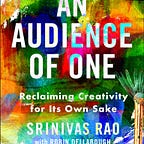Why You Should Never Stop Working In the Moment you Hit Flow
There’s nothing that will transform the quantity of your output and the quality of your work like hitting flow on a regular basis. And we know that hitting flow is usually the result of eliminating distractions, discipline, and deep work. The rush produced by hitting flow makes us feel fulfilled and successful. But it’s sometimes tempting to stop working the moment you feel that rush.
This wastes all the effort it took you to get into a state of flow. It’s kind of like a surfer who gets out of the water when he’s catching wave after wave. When you hit flow, you want to get as much out of being in that state as possible because that’s where your best work will emerge from.
When Will You Hit Flow?
This really differs for everybody. In a recent conversation with Sally Hogshead, she told me she blocks off 4 hours to write on her writing days. She knows that usually her first hour won’t be any good, and her second and third hour will be much better. You might hit flow 10 minutes into your work. Or it might take an hour. In my experience, I’ve found that you have to be willing to commit at least an hour a day to deep work if you’re going to find flow on a regular basis.
How to Induce Flow more Rapidly
Avoid multitasking: In my experience, nothing kills a state of flow faster than multi-tasking. When we multi-task we experience what is known as attention residue. When we return to the task at hand, our ability to focus on the task decreases.
- James Clear recommends using apps in full-screen mode
- Using an application like Xtab, you can reduce the number of tabs you can open at any time
- I’ve always been a proponent of distraction free writing tools like Macjournal. I use it to compose emails, write articles and much more.
- I LOVE Heyfocus because you can block everything from apps to web sites. It’s something I’ve referenced in nearly every one of my posts about productivity
Use Focus@will: This is a tool that helps to induce flow states by using music. It’s something that I use every morning when I write. It’s worth investing in a pair of decent headphones to use this. There are others that are similar, but this one is the one that I’ve found has the most effect. Maybe it’s a placebo, but if it works what does it matter.
Challenge Yourself: On a task that is repetitive mundane and easy, we’ll never hit flow. We to have challenge ourselves. We to have to be just outside of our comfort zone. This is why I almost always hit flow on the days when I wrote more than 1000 words.
Food/Diet/Supplements: I’m not a food or diet expert. But there a few things that I’ve found diet wise that make a big difference in my ability to focus.
- I have bulletproof coffee and a high protein breakfast every morning. I also drink lots of water. I try to avoid carbs in the morning. In the evening, I try not to drink any red wine or alcohol after 7pm.
- On occasion, I’ve used a supplement called Ciltep which helps quite a bit with concentration. For more detailed info on all this, take a look at the bulletproof podcast.
- No Devices Early in the Morning: I try to never turn on my computer for at least the first hour of the day. I do all of my initial writing by hand. But I do use my phone for a mediation session using Calm, and for the Focus at Will App. As I’ve said before, for success in life turn things off.
Work for a Little Bit Longer
Often when I hit flow during my daily practice of 1000 words, I’ll block distraction for another hour, and keep going. I’ll try to push past the 1000 words, and see if I can get to 2000, and on the best of days 3000. But we have to be aware of the diminishing returns that occur.
In a recent episode of Jonathan Fields’ Podcast, The Good Life Project, he spoke with Anders Ericsson, the man who popularized the notion of deliberate practice. It turns out that at about 5 hours we hit our limit and start to experience diminishing returns.
If you’ve never immersed yourself in a daily creative habit of any sort, 5 hours sounds completely insane. This is why I almost never recommend anybody starts with 1000 words a day. As I said before you should only try to change one habit at a time. Here a few ways to work for a bit longer:
- Increase your word count by 10 words each day
- Increase your practice time by a minute each day.
By gradually increasing the time, the word count or whatever metric you’re choosing to measure, you’re building your attention and deep work muscle. I don’t manage to hit intense states of flow on a daily bias. But by taking advantage of the days that I do, I’m able to be a prolific writer. Also, don’t forget that your cumulative output matters more than any individual things that you have created.
I’m the host and founder of The Unmistakable Creative Podcast. Every Sunday we share the most unmistakable parts of the internet that we have discovered in The Sunday Quiver. Receive our next issue by signing up here
